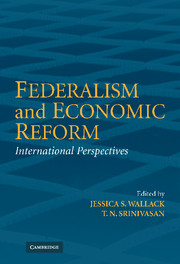Book contents
- Frontmatter
- Contents
- List of Contributors
- Acknowledgments
- 1 Analyzing Federalism: Stylized Models and the Political Economy Reality
- 2 Federalism in Argentina and the Reforms of the 1990s
- 3 Australia: Central Fiscal Dominance, Collaborative Federalism, and Economic Reform
- 4 The Brazilian Federation: Facts, Challenges, and Perspectives
- 5 Changing with the Times: Success, Failure, and Inertia in Canadian Federal Arrangements, 1945–2002
- 6 Fiscal Federalism and Economic Reform in China
- 7 Indian Federalism, Economic Reform, and Globalization
- 8 Mexico's Decentralization at a Crossroads
- 9 Transfer Dependence and Regional Disparities in Nigerian Federalism
- 10 Conclusions and Lessons for Further Study
- Index
- References
9 - Transfer Dependence and Regional Disparities in Nigerian Federalism
Published online by Cambridge University Press: 25 July 2009
- Frontmatter
- Contents
- List of Contributors
- Acknowledgments
- 1 Analyzing Federalism: Stylized Models and the Political Economy Reality
- 2 Federalism in Argentina and the Reforms of the 1990s
- 3 Australia: Central Fiscal Dominance, Collaborative Federalism, and Economic Reform
- 4 The Brazilian Federation: Facts, Challenges, and Perspectives
- 5 Changing with the Times: Success, Failure, and Inertia in Canadian Federal Arrangements, 1945–2002
- 6 Fiscal Federalism and Economic Reform in China
- 7 Indian Federalism, Economic Reform, and Globalization
- 8 Mexico's Decentralization at a Crossroads
- 9 Transfer Dependence and Regional Disparities in Nigerian Federalism
- 10 Conclusions and Lessons for Further Study
- Index
- References
Summary
INTRODUCTION
The entire history of Nigeria has been characterized by conflict among regions, social classes, and ethno-religious groups over resource allocation. Exploitation of oil deposits in the East and Midwest in the 1960s has only added to the intensity of the conflict: There have been over fifty ethno-religious conflicts and numerous other types of conflict since 1960. Regional disparities are widely perceived as one of the causes of continuing ethnic tensions in Nigeria. According to Post and Vickers (1973, p. 58), the most important grievance of various regions since the early 1950s has been that their wealth was being used to subsidize poorer regions.
Nigeria's recent history has also been characterized by extremely centralized political and economic power. Of the country's forty-three years of independence (obtained from Britain in 1960), twenty-eight have been under military rule. The country was nominally a federation at this point, but local leaders were appointed by the central government. Local elections have come with the recent transition to democracy, but the center still dominates via its control over resources and the allocation of the transfers that make up a large portion of their budgets.
This chapter focuses on how Nigerian fiscal federalism, especially the characteristics of the country's system for transfers to state and local governments, has affected and been affected by these regional disparities and tradition of centralization. Overall, we argue that Nigeria is not fiscally federalist but, rather, a de facto centralized distributive state.
- Type
- Chapter
- Information
- Federalism and Economic ReformInternational Perspectives, pp. 407 - 455Publisher: Cambridge University PressPrint publication year: 2006
References
- 2
- Cited by

